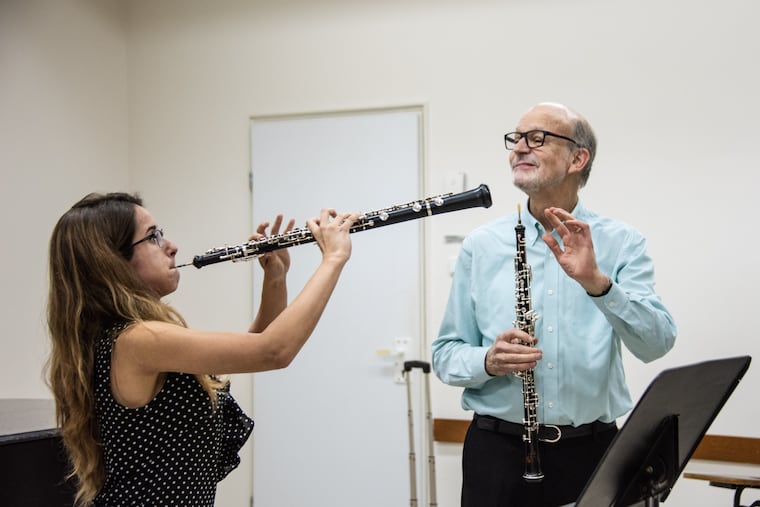Beloved Philadelphia Orchestra oboist Richard Woodhams returns
He joined his former colleagues in the Mozart Sinfonia concertante

Richard Woodhams retired from the Philadelphia Orchestra last season, and Saturday night he returned — not as principal oboist, but as soloist.
Three other wind players joined him in the spotlight at Verizon Hall for the Mozart Sinfonia concertante, K. 297b for winds and orchestra, and all were fine, of course. But this little postscript from Woodhams had a significance that reverberated beyond the confines of the one piece. Principal oboe is a prominent spot, and the audience ovation came like a gust of appreciation gathering energy over four decades.
What’s more, Woodhams once again reminded the orchestra exactly what’s at stake in terms of choosing a successor. He had been principal oboist since 1977 (Eugene Ormandy was music director) and arrived with lineage, having studied with his predecessor in the post, John de Lancie, who had studied with his predecessor, Marcel Tabuteau.
This means that over more than a century, as 18 U.S. presidents passed through the White House, the principal oboe chair of the Philadelphia Orchestra has had only three occupants. It’s a smart thing that the orchestra has spent the last 20 months since Woodhams’ public announcement of retirement trying out players and thinking about what style of oboe playing it wants next. It matters enormously.
The orchestra does not expect to have a new principal oboist named before the start of the new season, according to an orchestra spokesperson. “The search will continue in the fall,” she said.
As both a sound concept and a marketing tool, the strings of the orchestra are well-known. The winds, though, have traditionally shared common values no less highly developed. Tone, phrasing and blending have been at the core of it, and Woodhams was the section glue for a long time.
Saturday night’s soloists claimed a philosophy, and it was a playful one. They molded phrases with the freedom of a pianist — not always, but often. Yannick Nézet-Séguin was on the podium, and he seemed encouraging of these liberties and took some nice expressive freedoms of his own. Woodhams played with his trademark sweet refinement (though his sound wasn’t quite as loud as usual).
All of the soloists played beautifully and with personality: Woodhams, clarinetist Ricardo Morales, bassoonist Daniel Matsukawa, and hornist Jennifer Montone. For this work, whose full attribution to Mozart has been questioned, the orchestra had a slightly period-instrument quality to it, small of size and lean in sound.
Tradition echoed elsewhere in the program. The orchestra has long played works of some women, but with public criticism after announcing a 2018-19 season without a single female composer, the orchestra added some new pieces, and Saturday night’s Masquerade by Anna Clyne was among them. It’s a splashy work. Premiered in 2013 at the BBC Proms, it has both a sweeping, film-score sound as well as a more antique country-dance section. It’s taut and energetic, a wild ride with a pitch-bending technique that sometimes leaves you roller-coaster queasy.
Nézet-Séguin dipped into orchestra tradition by programming Rachmaninoff’s Symphony No. 1 in D Minor, but it was not a highly individualized performance. The piece is uneven, with a last movement that doesn’t match the clarity of the rest. The sudden gestures of the first movement spoke to the conductor’s strengths, and his physicality on the podium gave listeners an eyeful.
The program is repeated today, Sunday, at 2 p.m. at Verizon Hall, Broad and Spruce Streets. Tickets are $10-$169. www.philorch.org, 215-893-1999. The concert will also air live on WRTI-FM (90.1).